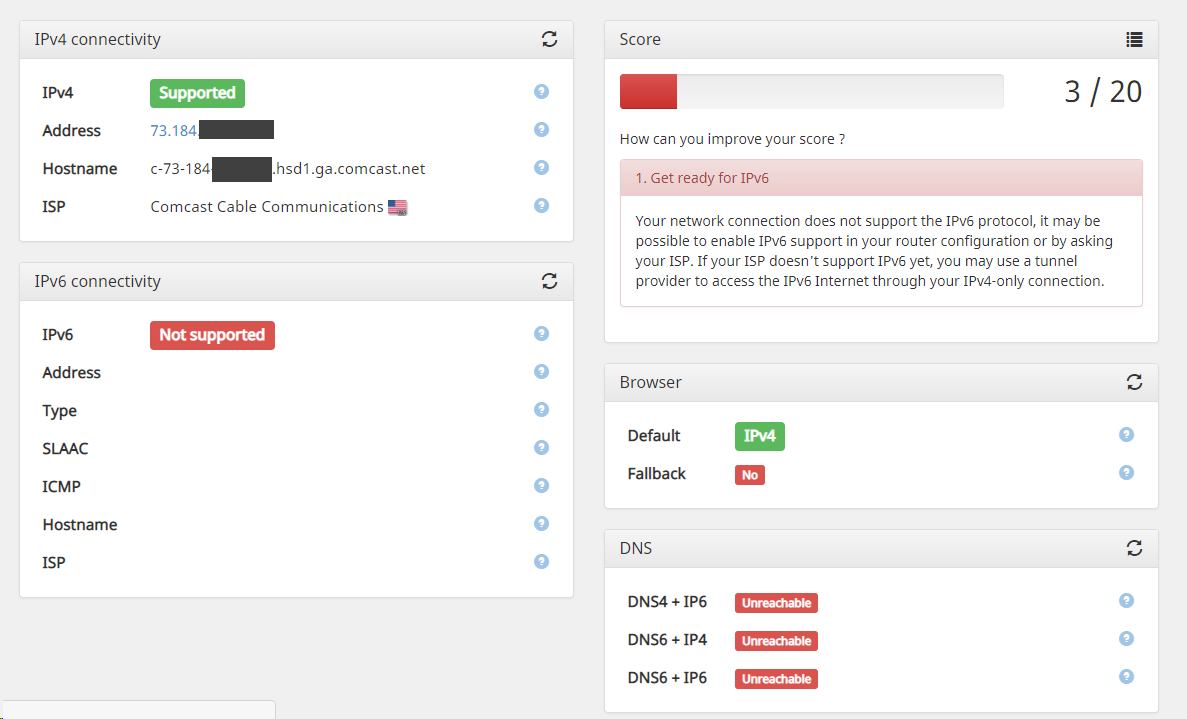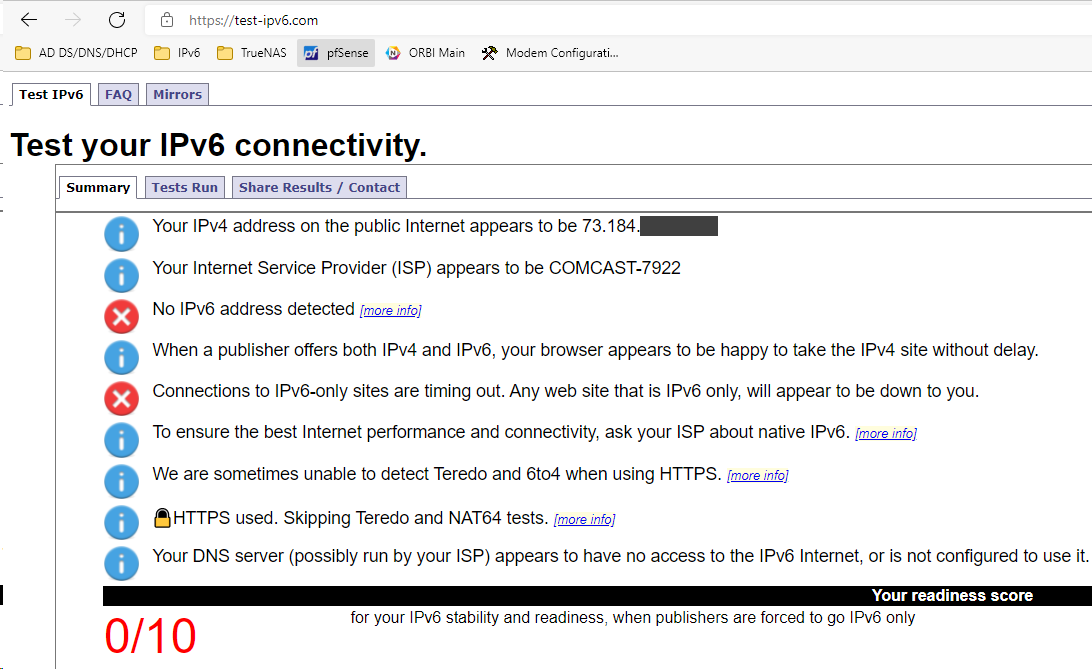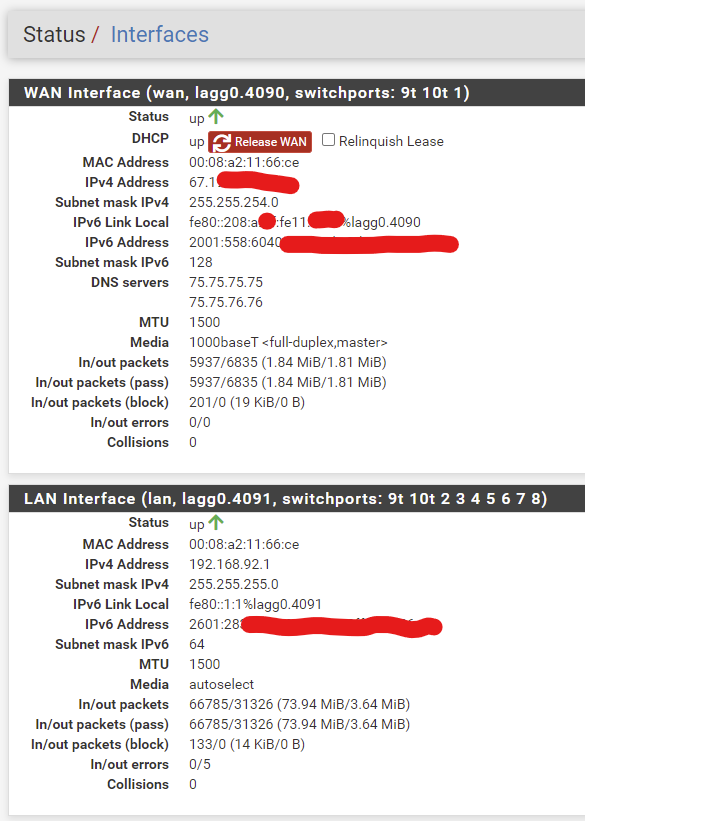Comcast Residential /64 Delegation
-
@jknott Considering our dependency on Windows, I expect to wake up one day and find out that Windows Update promulgated a delayed signed ransomware attack that simultaneously devastated both the enterprise and retail installs, and this then proceeds to global catastrophe.
-
Well this is FRUSTRATING AS HELL!!!
 Got up this AM - noticed that I had a new IPv4 Address on WAN from COMCAST - but the IPv6 one did not change. So I went to the IPv6 test page and now see what I get:
Got up this AM - noticed that I had a new IPv4 Address on WAN from COMCAST - but the IPv6 one did not change. So I went to the IPv6 test page and now see what I get:
I have done done this page too - where COMCAST support sent me:

This makes no sense - at all. Verified that IPv6 is still setup on the NIC of the Server - the same STATIC addresses I put there.

Curtis
-
I used to be a trainer at my job. I used to touch on IPv6 and explain follows:
IPv4 (State . City . Street . House #) - as an example of the 4 numbers.
IPv6 (Planet : Continent : Country : State : City : Street : House # : Room) - so a much more granular address.
It was kewl to see light bulbs come on. LOL
Curtis
-
Agreed - I 95% of the time login to my Windows computers as a 'mere-mortal' and only use Admin stuff when I need it.
I typically login if I have lots to do - on the DC as admin --- so I am not pestered with the warning (you must ask to be a god) --- LOL
Curtis
-
I think they are calling that WINDOWS 11 !!!

Microsoft in kahootz with the computer manufacturers to see more computers for which they cannot get chips for them - so the prices are 4x what they should be.
-
@bearhntr said in Comcast Residential /64 Delegation:
Well this is FRUSTRATING AS HELL!!!
Do a reboot of pfSense. I have to do that daily (via cron) to keep IPv6 working.
-
@bob-dig
OK - care to share? CRON? {steps???}
-
-
@bob-dig
I will have to reboot pfSense later - as I work from home, and in the middle of my day here. I will lose Internet during that period of reboot.
Let you all know.
Curtis
-
@bob-dig said in Comcast Residential /64 Delegation:
Check the box: Do not allow PD/Address release
That wouldn't cause a complete loss of IPv6, only a new prefix.
-
@jknott said in Comcast Residential /64 Delegation:
That wouldn't cause a complete loss of IPv6, only a new prefix.
For me pfSense is failing when the prefix changes so that is why I gave your advice.
-
@bearhntr that analogy not actually true - but ok.. IPv6 is no more granular than IPv4 - there is just way more addresses.
Does not make it more granular.
Think of it this way vs everyone living in say an apartment complex and the mailman having to just drop off and pick up mail from the mail room at the building (nat) - and the building mailman moving the mail to apt A, B and Z, etc.. The address on the mail was granular enough to get to the building, and even has which apartment it is and who - its just the building uses a address scheme for apt that the public mailman doesn't understand
With ipv6 each apartment can just send and get mail directly to their own mailbox.
-
@johnpoz For a residential account, that does not have any option of paying more than a single dynamic public IPv4 address, IPv6 definitely feels more functional in being able to get around this, especially without NAT, and ultimately can be more granular.
Not that I have tried this, but I know I can ping clients directly from anywere over both, but IPv6 should be much cleaner and direct, where IPv4 would require dynamic DNS, NAT, and port forwards to accomplish the same. For a residential account, IPv6 feels like a way around the ISP restricting static and multiple addresses.
-
@jpvonhemel said in Comcast Residential /64 Delegation:
and ultimately can be more granular.
No it is not more granular than IPv4 - still a just an address.. To a device - think you guys need to look up what granular means ;)
His analogy of address makes no sense in comparing ipv4 to ipv6, the ability to have more addresses does not add granularity to the address itself..
Your toaster having its own address - again doesn't add granularity. And that can be done with IPv4..
The ability to not have to nat - doesn't add granularity to the address. Yes IPv6 with the huge amount of space available allows users to have more addresses to use. But that has been possible with IPv4 - you not having enough IPv4 and having enough IPv6 doesn't add granularity - it just adds more addresses.
-
I was not trying to start an argument and I appreciate the help. But I must disagree. Just about every single router sold in the US has a default IP Address of 192.168.1.1 or 192.168.10.1 (I have had numerous). If every household in America had the same IPv4 address range for their home, they would all be 192.168.1.xxx (or .10.xxx) -- INSIDE their home.
Granted every network device would have its own MAC address - providing a granular break down of those addresses (within that home). As a MAC address (short for media access control address) is the worldwide unique hardware address of a single network adapter. The physical address is used to identify a device in computer networks. So even if your neighbor's TV and your TV both have the same IPv4 address (192.168.1.15) - they would have different MAC addresses...but also their Internet gateway would most likely be different as well even if on the same ISP.
What I was alluding to was the granularity of IPv6 to IPv4
(granularity -- [ˌɡranyəˈlerədē] NOUNTechnical
the scale or level of detail present in a set of data or other phenomenon.)Was that in IPv6 -- yes while having a much larger data pool of addresses. This being said, it does have a form of granularity in that traffic has a more direct path to a device - rather than having to hit multiple translation tables (ARPs).
Again - I was not trying to start an argument, but given MAC addresses are unique, and follows a world-wide 'format' - many IPv6 addresses are based on this MAC address (in fact may be part of the IPv6 address).
I saw in an online video several years ago - that within IPv6 there are enough IP Addresses that every man, woman, their children and pets for 4 generations and their devices could be assigned a specific address - and still have millions of addresses left over. <LOL - that is a lot of addresses>. So I am just waiting for that letter from the N.W.O. telling me I have been assigned an IPv6 address and that is my new "identifier".

-
Your analogy is wrong dude just plain and simple. A different address that points to the same thing does not provide more granularity.. Not wanting to argue - just pointing out that reason to move to IPv6 doesn't make any sense. Getting rid of nat doesn't provide more detail to what you point to.
Detail - the detail does not change from an IPv4 to IPv6.. Be it that IP is natted or not - 1.2.3.4:80 gets to my webserver.. "aaaa:bbbb:: 1234:80" still gets to my webserver.
Switching to IPv6 does not provide any more granularity than the IPv4..
multiple translation tables (ARPs).
What? Are you talking about mac - again every layer 2 your traffic passes through will use different mac addresses to move the traffic. Just be cause you have IPv6 doesn't make some magic tunnel between, still lots of hops to get there.
So what if everything on the planet can have an IP - this does not add detail to what that address is.. Still points to X, be it ipv4 or ipv6..
-
One thing I've often said is there are enough addresses to give every person on earth over 4000 /48s.
-
@jknott Yup agree - doesn't mean any specific address has more "detail" over the IPv4 address.. Which was my point about why the analogy being bad.
Sure there are advantages to having really unlimited address space - the big one hey no nat, hey your phone and and ipad and laptop and watch and etc.. etc.. Can all have their own address. But this does not add "detail" So going to IPv6 does not add granularity like what planet.
To be honest with with IPv6 and devices all just using random temp IPvs to talk to something - you could say granularity in my firewall rules become more difficult. How do I allow or block device X from going to xyz, if he could use any address in the whole /64 to go there, verse if he was IPv4 I would know exactly what address he was coming from.. Its very simple and easy to set it to have only that IP address via dhcp reservation.
While this is possible with ipv6 - its not as simple, and there is a huge learning curve. And depending on the devices you might not be able to use dhcpv6, they might only support slaac. Also with something like comcast and your prefix changing - now your rules become even more difficult trying to use granularity of specific details of device X, when that could change at the drop of hat.
-
@johnpoz said in Comcast Residential /64 Delegation:
How do I allow or block device X from going to xyz
It would be easy enough if pfsense could filter on MACs, as some other firewalls do.
-
I want to wade carefully into the granularity discussion with regards to IPv6.
Both of you are correct, but you are coming to your conclusions from what I think are different directions.
First, IPv6 has 128 in the exponent. That yields a hugely, enormous, gigantic address space. It is IPv4 gone absolutely crazy. There are probably enough available IPv6 addresses to give every cell in your body its own address (perhaps many times more than enough, as I did not bother to Google how many cells are in our body
 ).
).But the standards that define IPv6 are not really any different than those governing IPv4 space. The various sections of the address get used to coordinate routing, just like the network parts of IPv4 addresses today. So @johnpoz is correct to say IPv6 does not currently offer any more "granularity". It just offers more of the same level of "granularity" as IPv4 does today. All I can really do is identify a network and a host with IPv4 or with IPv6. IPv6 just gives me a lot more hosts, but does not inherently tell me anything about the various hosts.
However, from @bearhntr's point of view, because IPv6 offers so many more available combinations of bits for an address, the potential is there for more "granularity". Notice I said "potential", though. The current standards do not use any of that potential.
Here's what I mean. Suppose I am a major nationwide ISP. Because I have so many bits available, I could start carving up the network portion of the IPv6 addresses into much finer pieces say for geolocation (as one example). Today, with IPv4, the best you usually get is perhaps a city name based on the IPv4 subnet. That's because there aren't enough bits to start splitting that down to the individual neighborhood and street level and still leave enough bits to have unique hosts. But with IPv6, I could perhaps carve my network geolocation up down to the street level. And even up to individual buildings on that street (or apartments in a complex). So from this point of view, I can say IPv6 has more "granularity". Not that it inherently has more, but that I can give it more by purposefully using the additional address bits to help me segregate things more.
Here is another example. Because there are so many addresses, it would be feasible to create some standard that isolates some portion of the IPv6 address bits to specify maybe a device type such as toaster, refrigerator, oven, car, etc. This would require action at an international level to create and maintain, and that has not been done. But if it was, then you could say IPv6 offers additional "granularity" because you could identify what type of device you were talking to by noting some bit pattern in its address. Sort of like how MAC addresses today contain a prefix that identifies the manufacturer of the card.
So both of you are right, but you are coming at the problem from different points of view. At the moment, IPv6 does not automatically offer more granularity. That's because we are not taking advantage of some possibilities the additional number of address bits offers. However, if we did standardize on a method for sub-dividing the address bits and assigning some intelligence to those divisions, then you could argue IPv6 offers more granularity.
